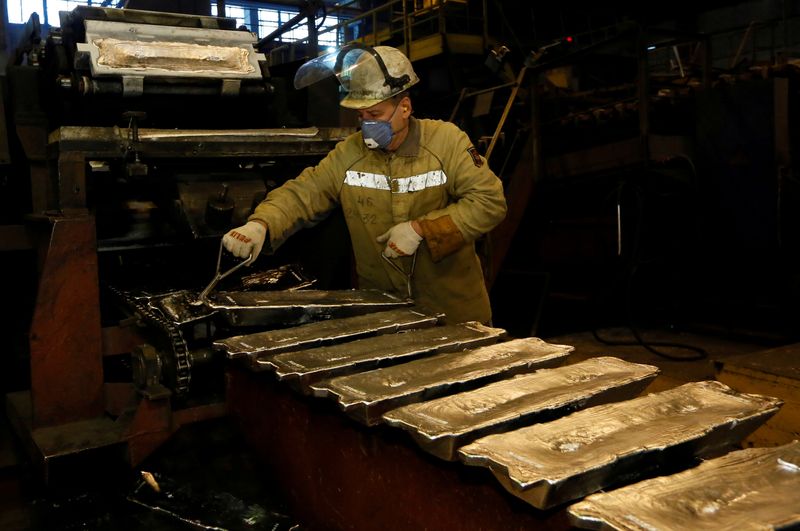MOSCOW – Escalating tensions between Moscow and Western countries over Ukraine and the possibility of sanctions against Russia have fuelled fears supplies of key commodities produced and exported by Russian companies could suffer.
The United States and European countries have threatened to impose sanctions on Russia if it invades Ukraine, something Moscow has repeatedly denied planning.
Prices of nickel and aluminium have soared to multi-year highs on supply disruption fears.
Following are some details about Russia’s major commodity exports.
ALUMINIUM
Most Russian metal producers have so far escaped sanctions imposed by the West since Moscow annexed the Crimea in 2014.
One exception is the world’s largest aluminium producer outside China, Rusal, under sanctions imposed by the United States between April 2018 and early 2019.
Rusal produced 3.8 million tonnes of aluminium in 2021, about 6% of the estimated world production.
Europe, Asia and North America are Rusal’s main markets. Miner and commodity trader Glencore has a long-term deal running until 2025 to buy primary aluminium from Rusal.
COBALT
Data from U.S. Geological Survey (USGS) shows Russia produced 7,600 tonnes of cobalt last year, more than 4% of world total.
Russia was the second largest producer, far behind the Democratic Republic of Congo which produced 120,000 tonnes.
Nornickel is the largest producer in Russia, selling 5,000 tonnes in 2021. Nornickel sells most of its output to Europe.
COPPER
Russia produced 920,000 tonnes of refined copper last year, about 3.5% of the world total, according to USGS, out of which Nornickel produced 406,841 tonnes.
UMMC and Russian Copper Company are the other two major producers.
Asia and Europe are the main export markets.
NICKEL
Nornickel is the world’s top producer of refined nickel. It produced 193,006 tonnes in 2021 or about 7% of global mine production estimated at 2.7 million tonnes. It sells to global industrial consumers under long-term contracts.
PALLADIUM AND PLATINUM
Nornickel is also the world’s largest producer of palladium and a major producer of platinum.
It produced 2.6 million troy ounces of palladium last year or 40% of global mine production and 641,000 ounces of platinum or about 10% of total mine production.
GOLD
Russia is the world’s third largest producer of gold after Australia and China and accounts for about 10% of global mine production, which according to the World Gold Council totalled 3,500 tonnes last year.
Russian gold is produced by companies that include Polyus and Polymetal. Russian miners mainly sell their gold to the country’s commercial banks which then export it.
STEEL
Russia produced 76 million tonnes of steel or nearly 4% of the global total, according to the World Steel Association.
Severstal, NLMK, Evraz, MMK and Mechel are Russia’s main producers. They export about half of their production, mainly to Europe.
The country’s ferrous sector also includes Metalloinvest, making iron ore products, and TMK, making steel pipes.
DIAMONDS
State-controlled Alrosa, the world’s largest producer of rough diamonds, produced 32.4 million carats in 2021, about 30% of the global total. It exports mostly to Belgium, India, and the United Arab Emirates.
FERTILISERS
Russia is a major producer of potash, phosphate and nitrogen containing fertilisers – key crop and soil nutrients. It produces more than 50 million tonnes a year of the fertilisers, 13% of the global total.
Phosagro, Uralchem, Uralkali, Acron and Eurochem are the biggest players.
They export to Asia and Brazil.
WHEAT
Russia is the world’s largest wheat exporter, with Turkey and Egypt among its main buyers. [GRA/RU]
It produced 76 million tonnes of wheat last year and is expected by the U.S. Department of Agriculture to export 35 million tonnes in the July-June season, 17% of the global total.
Russia has been curbing grain exports since 2021 with quotas and taxes as part of its wider efforts to subdue inflation.
The global market fears supplies could get disrupted if the conflict between Russia and Ukraine escalates and affects commercial shipping in the Black Sea, the main wheat export route of the two countries.
(Reporting by Polina Devitt and Pratima Desai; Editing by Tomasz Janowski)
